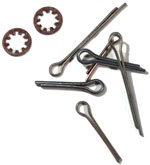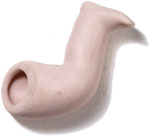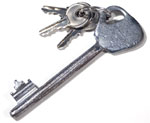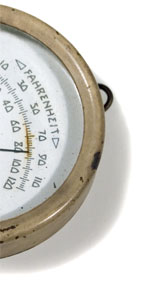SAFELY BURIED: A MURDER MYSTERY
by John Pesta
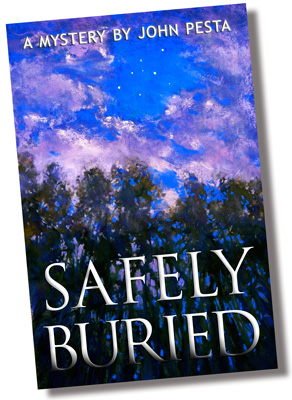
John Pesta’s mystery, “Safely Buried,” is now available for purchase as a paperback at Amazon.com and in the Kindle e-book store. The novel was first serialized here on Fine Words Butter No Parsnips in 2010.
Chapter One, "A Woman in a Cast," follows:
It was ten at night. I had just come off I-65, and my high beams lit her up from behind. She was walking along the road between dark, endless cornfields, and her right leg was in a cast. She wore denim shorts and a yellow tank top that didn’t quite reach the shorts. Without crutches, she moved as fast as she could on the gravelly shoulder. She would take a long step with her good leg, stiffly swing the cast forward the same distance, and immediately start the next step. Tilting jerkily, she looked as if she would fall with every stride. I crossed the centerline to give her more room to fall. Just as I was about to pass her, she glanced over her shoulder and stuck out a thumb.
I thought her car must have broken down back up the road. But if that was the problem, why hadn’t she stayed there instead of striking out for Campbellsville, eight miles away? I was tempted to keep on going—I didn’t make a habit of picking up hitchhikers. But there she was, nearly helpless. How could I leave her out here in the middle of nowhere?
I pulled off the road about a hundred yards in front of her and put the car in reverse. The little Civic whirred like a windup toy. She hurried toward me, her cast flailing. I hit the brakes and pushed the door open. I heard her panting, scraping.
She leaned over and peered at me. “Thanks,” she said. “I really appreciate this.” She was good looking in a tough sort of way. “I don’t know if I can fit in there,” she said.
A cloud of beer fumes wafted toward me. I should have known she must be either drunk or stoned. All I needed was for her to throw up in the car.
“I can move the seat,” I said. I reached down for the lever and slid the seat all the way back.
The corner of her mouth crinkled into a sneer. “That’s better, slightly.” Without sitting down, she jimmied herself inside by bracing her left leg under the dashboard and pushing herself up against the back of the seat. “Damn it,” she muttered under her breath as she struggled to get the cast in. Next a prayer: “There. Made it. Thank God.” She slammed the door. “I just hope I can get out again.”
She was half sitting, half braced against the seatback. “You don’t look very comfortable,” I said.
“Hah! That’s an understatement if I ever heard one.”
She was in her late twenties, maybe early thirties. Her light-brown hair was a mess of tangles, but the breezy look was kind of nice. She had a thin face with sharp features—straight nose, tightly drawn lips.
I waited for a semi to pass, and then I got back on the highway. “Where are you going?” I asked her.
“Not far. I’ll show you.”
“How come you’re hitchhiking? Your car break down?”
She shook her head. “I don’t have a car. I thumbed a ride from Indy.” She pressed both hands on the seat to support her mostly suspended body.
“What brings you way down here?”
Instead of answering, she made a long yawn, then slapped both sides of her mouth as if apologizing. “I’m going to see some friends of mine. We’re almost there. We cross an old iron bridge, and their house is on the other side.” She scooted a couple inches closer to me to make more room for the cast.
“I don’t think so,” I replied. “There’s a bridge up ahead, but it’s not iron, and we’re not almost there.”
“Yes we are. You think I’m lying to you?”
She did not sound totally bombed, but she definitely was lost. What had I gotten myself into? She stared straight ahead, as if trying to spot a road that wasn’t there. We were in the river bottoms, and it was too dark to see anything except the white lines on the highway. There were no houses, no billboards, no stars. She yawned again.
“Don’t fall asleep,” I said. “You need to tell me where we’re going.”
“Don’t worry, I won’t fall asleep.”
“You’re half asleep already. By the way, how did you break your leg?”
“Hey, you got anything to drink?”
"Sorry, no. How’d you break your leg?”
"Not even some water? My last ride had a cooler of beer.”
“Maybe you should’ve stayed with him.”
She pretended to shiver. “No way. He gave me the creeps.” Then I got the answer to my question: “I fell off the roof at my mother’s house while I was patching a hole—a tree branch poked a hole through the shingles and decking.”
“Really? You fell off the roof? How high was it?”
“Not that high. No more than ten feet, I’d say.”
“You’re lucky the only thing you broke was your leg.”
"Yeah, well, I have a pretty hard head.”
From the beery breath and the way she talked, I guessed she worked in a bar. I figured I’d find out for sure pretty soon.
“Who are these friends you’re going to visit?”
“We used to be neighbors before they moved to the sticks.”
“What’s their name?”
“Cheryl and Wayne.”
“Cheryl and Wayne what?”
“Garth. Why?”
“I just wondered if I might know them.”
She took a deep breath, almost another yawn. “They moved down here because they wanted to have horses.”
“And what’s your name?”
“Paula.”
“Paula what?”
“Henry. And please don’t say ‘Henry what?’”
“Nice to meet you, Paula. I’m Phil.”
With a triumphant laugh she shot back, “Phil what?”
“Larrison.”
At least she was still awake.
“Here comes the bridge,” I said. “It’s not iron, or steel, though. It’s concrete.”
As soon as we crossed the bridge, the land began rising and scattered houses appeared. Brickton, a small unincorporated village, lay just ahead. I slowed down and said, “Is this where your friends live?”
She did not answer. Her eyes scanned the mostly dark houses.
“So where do they live?” I repeated.
She shook her head slowly. “I’m looking for the street.”
Brickton did not have many streets, and there was no iron bridge between here and Campbellsville.
Suddenly she erupted: “There! That’s where we go.” She jabbed a finger at the major intersection in Brickton. “Turn right, turn right!”
I made the turn as ordered and drove at a crawl past a half dozen old two- and three-story frame houses. “Are you sure we’re in the right place?” I asked her. “Maybe you got off the interstate at the wrong exit.”
She dropped her hand on her lap. “I’m not that stupid.”
“Well, what do you want me to do now?” I asked her.
She chewed on her lip. Then she turned and looked at me. “If you want me to, I’ll get out here, but if you don’t mind, would you just go out this street a little ways. They live in the country. Cheryl drove me down here once to see her place when they first moved in. I know this is the right street. But it’s dark now, and Cheryl brought me here in the daytime.”
“Sure, why not?” I said. “I’ve got nothing else to do.”
So on we went. Give it another half hour or so, I told myself. After that I could bring her back to Brickton or drop her off at a motel in Campbellsville. Besides, I really did have nothing else to do. I was on my way home from the community college where I moonlighted as an adjunct, teaching Journalism 101. At home all I would do is plop myself in front of the TV and fall asleep.
We passed a cluster of enormous grain bins and left the few lights of Brickton behind. Bugs by the hundreds began splattering the windshield. I made a mental note of the time: 10:28. Give it till 10:58. Thinking of the time made my eyelids feel heavy.
Paula must have sensed I was getting tired. She put her hand on my wrist and said, “Phil, I want you to know I really appreciate you helping me like this tonight. I know I’m making you go way out of your way. It’s real nice of you.” The sudden contriteness in her voice sounded too apologetic. She probably thought I needed a pat on the head to keep driving.
“No problem,” I lied. “I just hope we find your friends.”
Her hand slid off my wrist. “You and me both.”
I slowed down as we came to a Y in the road. I asked which way she wanted to go.
She hesitated a moment, then pointed left. “That way.”
Now and then we passed a house or a trailer or a barn as we rolled through the flat farm fields, smashing more bugs. Once a pickup truck tailgated us for more than a mile before shooting past with its radio blaring rap music. Another fifteen minutes passed. We were almost in the knobs. Above us not far ahead were the two radio towers that served Campbellsville and Meridian County. Their lights cast a reddish glow on the underside of the thick mass of clouds.
“Any of this look familiar?” I asked her.
“It might if I could see it,” she said. “It’s too dark.”
“Maybe we should’ve gone the other way back at that fork.”
“No, this is the way. I just forgot how far it was.”
My patience was wearing out. This whole thing was nuts. And I was nuts for going along with it.
We drove up a steep hill, followed the ridge briefly, and started down the other side. The forest was filled with the rasp of locusts.
Finally I said, “This isn’t working. How about if we go in to town and I drop you off at a motel so you can get a good night’s sleep. You can find your friends in the morning.”
“I can’t afford a motel.”
“Don’t you have any money on you?”
“Some, but I’m not gonna throw it away on a motel.”
“Well, we can’t drive around out here all night.”
She stiffened. “Okay, then stop the car and let me out. I’ll find them by myself.” She was silent for a few seconds, then added, “Their place can’t be far from here.”
“Yeah, right,” I said. “Come on, I’ll take you to a motel in town. I’ll even help you pay for the room—if you’ll let me.”
“No thanks. I’d rather take my chances out here.”
So now I was a threat.
She said, “You can let me out any time now.”
I kept going.
The woods ended at the bottom of the hill, and once again we were driving past farms. We went up a short rise onto a one-lane bridge, and Paula whirled toward me: “This is it! This is the bridge I told you about!”
“I thought you meant a big bridge.”
“I never said it was big. I said it was made of iron, and we just crossed an iron bridge. The house should be coming up soon.”
There was a brick ranch home on the left, but she shook her head and said, “Keep going.”
A log cabin appeared on the right, then a white mailbox by a gravel road. “Turn there,” she commanded.
It was hard to believe we had found the house she was looking for. In fact, I did not believe it. As we started down the gravel lane, there was no house in sight, just a cornfield on one side, a pasture on the other. We clanked over an old cattle guard and came around a bend in the corn, and Paula shouted, “There, there it is, just like I said. And you thought I was making it all up.”
A tall farm house that looked at least a hundred years old stood like a white patriarch near the foot of another steep hill. The windows were dark.
“They must be in bed,” Paula said. “Blow the horn.”
“You want to wake them up?”
“I sure do.”
I tapped the horn twice. It sounded like Little Boy Blue’s. I hit it again, but no lights came on. “Looks like nobody’s home,” I told her.
“Damn, where are they?” She fumbled with the handle and flung the door open. She began twisting and squirming to get the cast out. “You need a bigger car,” she griped.
I left the motor running with the headlights aimed at the house and got out to help her. By the time I came around to her side, Paula had her cast halfway out of the car. When she got both feet on the ground, I held her hands and pulled her up. She took off at once, hobbling across the overgrown lawn.
“Nobody’s home,” I called after her. “By now they would have heard us.”
She did not answer. Left leg first, she climbed the four steps to the porch one at a time. She knocked on the door. When nothing happened, she banged on the window in the upper half of the door. “Cheryl, it’s me—Paula,” she yelled. “Are you there?” She banged away again. “Come on, get out of bed. Let me in.”
As I started up the steps, the glass shattered. I thought she had broken it by knocking too hard, until she bent over and wiped her bloody elbow on the cast.
“I hope there’s nobody sitting in there with a shotgun,” I said.
“I gotta use the john,” she said.
Thinking ahead this time, she removed her one shoe and used the heel to knock out a jagged piece of glass. Carefully she reached inside and felt for the lock. The door squealed open.
“Are you coming?” she said.
“Why not? What’s a little breaking and entering?”
She found the light switch, and we stepped inside.
The stench was overwhelming. The house was filled with the smell of death.
To read the next 36 chapters of “Safely Buried,” we hope you’ll consider buying either the paperback at Amazon.com or the Kindle e-book. Thank you very much!

